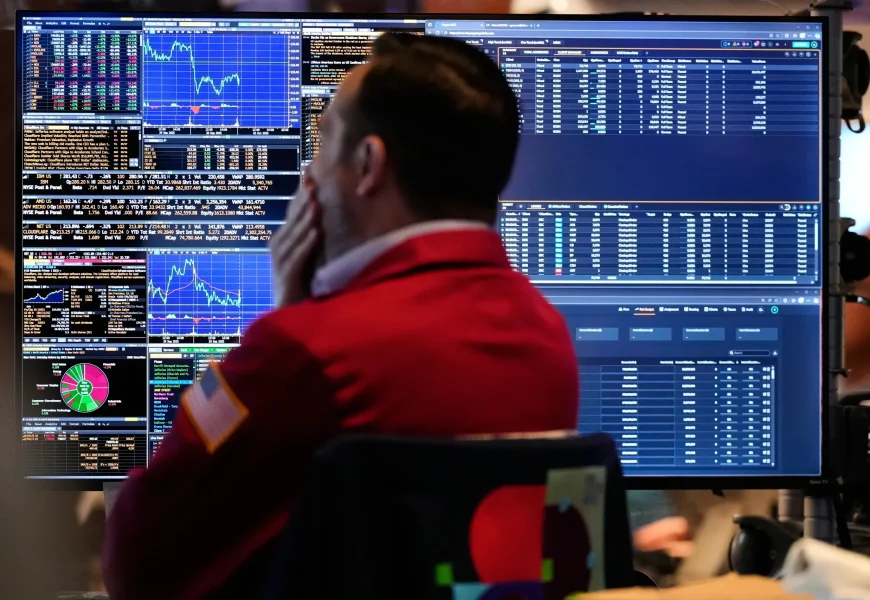NEW YORK (AP) - A rebound for Nvidia propped up a weakened Wall Street Tuesday. The S&P 500 rose 0.4% and neared its all-time high set a week earlier, while the Nasdaq composite leaped 1.3% for its first gain in four days. The Dow Jones Industrial Average sank 299 points, or 0.8%.
Stock market today: Nvidia rebounds, and it’s back to masking losses for the rest of Wall Street
NEW YORK (AP) - A rebound for Nvidia propped up a weakened Wall Street Tuesday.
The S&P 500 rose 0.4% and neared its all-time high set a week earlier, while the Nasdaq composite leaped 1.3% for its first gain in four days. Such strength came even as most stocks outside Wall Street's frenzy around artificial-intelligence technology fell.
The Dow Jones Industrial Average, which doesn't include Nvidia among its members, was a laggard and sank 299 points, or 0.8%.
Nvidia climbed 6.8%, and without that gain, the S&P 500 would have dropped to a loss for the day. The chip company's shares snapped a three-day losing streak where they had lost nearly 13% for their worst such stretch since 2022.
It's just one stock, but Nvidia has the power to swing the S&P 500 around because it's grown to become one of Wall Street's largest and most influential companies.
Voracious demand for Nvidia's chips to power artificial-intelligence applications has been a big reason for the U.S. stock market's run to records recently, even as the economy's growth slows under the weight of high interest rates. But the AI boom has been so frenzied that it's raised worries about a possible bubble in the stock market and too-high expectations among investors.
The recent struggles for Nvidia haven't caused too many concerns, at least not yet. Part of that is because Nvidia's 13% dip over three days was a drip compared with its 1,000% surge before that since autumn 2022. Market watchers have also been hoping for more stocks to participate in the rising stock market rather than just Nvidia and a handful of AI winners.
That's what happened Monday, when banks, oil companies and other stocks outside the AI boom rallied as Nvidia sank. But it may be a challenge for such stocks to keep picking up slack from AI darlings depending on how much more the U.S. economy's growth slows.
In financial markets, the focus is starting to swing toward growth and away from just inflation and interest rates, according to Michael Wilson and other strategists at Morgan Stanley.
Pool Corp., a distributor of swimming pool supplies, tumbled 8% after it said construction of new pools is falling amid "cautious consumer spending on big ticket items" and cut its financial forecasts for the year.
It was the worst performer in the S&P 500, but Pool wasn't alone. Three out of every four stocks in the index fell.
SolarEdge Technologies dropped 20.6% after it said a customer that owes it $11.4 million filed for Chapter 7 bankruptcy, which raises questions about how much the solar-power company can collect and when. The smaller companies in the Russell 2000 index also fell 0.4%.
Broadly, sales at retailers across the country have been up and down recently as companies highlight how lower-income customers are struggling to keep up with still-rising prices. The job market, though, still looks mostly solid. A report on Tuesday also showed confidence among U.S. consumers fell this month, but not by quite as much as economists expected.
Upper-income households seem to be doing better, and they're booking trips on cruise ships. Carnival steamed 8.7% higher after it raised its profit forecast for 2024. The cruise company said bookings for the rest of the year are the best on record in terms of both price and occupancy. And bookings for next year may end up even better.
All told, the S&P 500 rose 21.43 points to 5,469.30. The Dow dropped 299.05 to 39,112.16, and the Nasdaq composite jumped 220.84 to 17,717.65.
In the bond market, Treasury yields held relatively steady. The yield on the 10-year Treasury remained at 4.23%, where it was late Monday.
It's been mostly falling since topping 4.70% in late April, which has relaxed the pressure on the stock market. Yields have sunk on hopes that inflation is slowing enough to convince the Federal Reserve to cut its main interest rate later this year.
The Fed has been keeping the federal funds rate at the highest level in more than 20 years, hoping to grind down on the economy just enough to get inflation under control. The hope on Wall Street is that the Fed will cut interest rates at the exact right time. If it waits too long, the economy's slowdown could careen into a recession. If it's too early, inflation could reaccelerate.
Investors have been itching for the first cut to interest rates, with many traders betting on it arriving in September. But stocks don't always rise afterward. Since 1974, the S&P 500 has dropped an average of roughly 20% in the 250 days following the first rate cut, according to Wells Fargo Investment Institute.
That's because it matters why the Fed is cutting rates. If it's doing so simply because inflation has slowed enough to cut rates, that could be good for stocks. But if it cuts because the economy is spinning toward a recession, that's different.
In stock markets abroad, indexes fell across much of Europe and rose in much of Asia.



















































